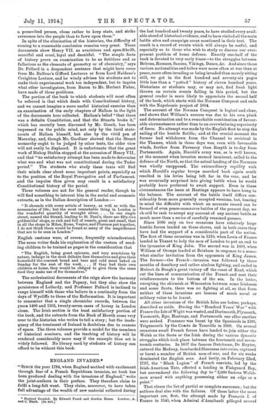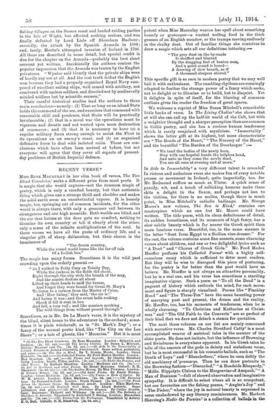ENGLAND INVADED.*
- " SINCE the year 1794, when England seethed with excitement through fear of a French Republican invasion, no book has been produced dealing with the invasions of England," write the joint-authors in their preface. They therefore claim to fulfil a long-felt want. They claim, moreover, to have taken full adiantage.of the wealth of new material collected during * England Invaded. By Edward Foord and Gordon Home. London : A. and C. Black. [8a. net.]
the last hundred and twenty years, to have studied every avail- able shred of historical evidence, and to have visited all the main battle sites and campaign areas mentioned in their text. The result is a record of events which will always be useful, and especially so to those who wish to study or discuss our ever- present problem of home defence. Exactly one-half of the book is devoted to very early times—to the struggles between Britons, Romans, Saxons, Vikings, Danes, &c. And since these various nationalities and tribes were more often at war than at peace, more often invading or being invaded than merely sitting still, we get in the first hundred and seventy-six pages little less than a " potted " history of eleven hundred years. Historians or students may, or may not, find fresh light thrown on certain events falling in this period, but the general reader is more likely to appreciate the second half of the book, which starts with the Norman Conquest and ends with the Napoleonic project of 1804.
The account of the Norman Conquest is logical and clear, and shows that William's success was due to his own pluck and determination and to a remarkable combination of favour- able circumstances rather than to an overwhelming superiority of force. No attempt was made by the English fleet to stop the sailing of the hostile flotilla; and at the crucial moment the former had withdrawn from the Channel to revictual in the Thames, which in those days was, even with favourable winds, further from Pevensey than Rosyth is to-day from Portsmouth. Again, Harold's army was, as is well known, at the moment when invasion seemed imminent, called to the defence of the North, so that the actual landing of the Normans was wholly unopposed. The extraordinary rapidity with which Harold's regular troops marched back again south resulted in his levies being left far in the rear, and hi was eventually surprised into giving battle when he would probably have preferred to await support. Even in these circumstances the issue at Hastings appears to have hung in the balance. The account of the battle itself differs con- siderably from more generally accepted versions, but, bearing in mind the difficulty with which an accurate record can be formed of even peace-manoeuvre battles of the present day, we Should be rash to accept any account of any ancient battle as much more than a series of carefully reasoned guesses.
Since 1066 only on two occasions have relatively large hostile forces landed on these shores, and in both cases they have had the support of a considerable part of the nation. The first of these occasions was in 1216, when Louis of France landed in Thanet to help the men of London to put an end to the tyrannies of King John. The second was in 1688, when William of Orange landed at Brixham in response to a some- what similar invitation from the opponents of King James. The former—the French—invasion was followed by three months of desultory and rather aimless fighting, and ended in Hubert de Burgh's great victory off the coast of Kent, which cut the lines of communication of the French and sent their reinforcements to the bottom of the sea. In the latter, excepting the skirmish at Wincanton between some Irishmen and some Scots, there was no fighting at all, so that from neither of these invasions are lessons of much naval or military value to be learnt.
All other invasions of the British Isles are better, perhaps, described as raids. During the "Hundred Years' War" with France the Isle of Wight was wasted, and Dartmouth,Plymouth, Yarmouth, Rye, Hastings, and Portsmouth one after another were sacked. Penzance was burnt by the Spaniards in 1595, Teignmouth by the Comte de Tourville in 1690. On several occasions small French forces have landed to join either the Welsh or the Scots or the Irish during the various dynastic struggles which took place between the fourteenth and seven. teenth centuries. In 1667 the famous Dutchman, De Ruyter, entered the Medway, bombarded Sheerness into ruins, captured or burnt a number of British men-of-war, and for six weeks dominated the English seas. And lastly, on February 22nd, 1797, the " Black Legion " of French convicts, led by the Irish-American Tate, effected a landing in Fishguard Bay, but surrendered the following day to " 2,000 furious Welsh-- men armed with anything possessing either an edge or a point."
That closes the list of partial or complete successes ; but the authors deal also with the failures. Of these latter the most important are, first, the attempt made by Francois I. of France in 1545, when Admiral d'Annibault pillaged several
fishing villages on the Sussex coast and landed raiding parties in the Isle of Wight, but effected nothing serious, and was finally defeated by Lord Lisle off Shoreham Harbour; secondly, the attack by the Spanish Armada in 1588; and, lastly, Hoche's attempted invasion of Ireland in 1796. All these are described in some detail, but special credit is due for the chapter on the Armada-probably the best short account yet written. Incidentally the authors contest the popular impression that the Armada was beaten by the English privateers. " Wynter said bluntly that the private ships were of hardly any use at all. And the real truth is that the English won. because they had a properly organized Royal Navy com- posed of excellent sailing ships, well armed with artillery, not cumbered with useless soldiers, and directed not by mediaevally minded soldiers but by scientific seamen."
Their careful historical studies lead the authors to three main conclusions-namely: (1) That so long as an island State holds the command of the sea, and exercises that command with reasonable skill and prudence, that State will be practically invulnerable ; (2) that in a naval war the operations must be vigorous and drastic and not wasted upon mere destruction of commerce ; and (3) that it is necessary to have (a) a regular military force strong enough to assist the Fleet in its operations on an enemy's coast, and (b) an organized defensive force to deal with isolated raids. These are con- clusions which have often been arrived at before, but not everyone will agree that they cover all aspects of present- day problems of British Imperial defence.







































 Previous page
Previous page